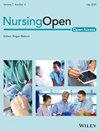The relationships between quality of life with health literacy, social support and resilience in older stroke survivors: A structural equation model
IF 2
4区 医学
Q2 NURSING
引用次数: 0
Abstract
AimTo the determinants and the underlying mechanism of health literacy, social support, and resilience on the health‐related quality of life (HRQoL) among older stroke survivors.DesignA cross‐sectional design was applied at four comprehensive hospitals in Chongqing via convenience sampling from January 2020 to June 2021.MethodsHealth literacy, social support, and resilience were designed as independent variables, and HRQoL was measured as a dependent variable. Structural equation modelling with the bootstrap method was used to test the hypotheses.ResultsThe theoretically derived model exhibited a good fit (老年中风幸存者的生活质量与健康素养、社会支持和复原力之间的关系:结构方程模型
目的研究健康素养、社会支持和复原力对老年脑卒中幸存者健康相关生活质量(HRQoL)的决定因素和内在机制。方法将健康素养、社会支持和复原力作为自变量,HRQoL作为因变量进行测量。结果理论推导的模型拟合度良好(χ2/df 比 = 2.830,GFI = 0.987,CFI = 0.978,RMSEA = 0.066)。健康素养(β = 0.12,p < 0.05)和社会支持(β = 0.14,p < 0.05)直接影响 HRQoL。复原力(β = 0.40,p < 0.01)也是健康素养、社会支持和 HRQoL 之间关系的中介。这三个变量解释了 29.0% 的 HRQoL 变异。患者或公众的贡献本研究的设计、实施或报告没有患者或公众的直接参与。研究人员是从重庆市四家综合性医院中通过方便抽样的方式招募的,并没有明确征求他们的观点或贡献。本研究主要探讨了健康素养、社会支持和复原力对老年脑卒中幸存者健康相关生活质量的决定因素和内在机制。尽管如此,本研究的结果仍可为制定旨在改善脑卒中后老年患者健康相关生活质量的干预措施提供参考。
本文章由计算机程序翻译,如有差异,请以英文原文为准。
求助全文
约1分钟内获得全文
求助全文
来源期刊

Nursing Open
Nursing-General Nursing
CiteScore
3.60
自引率
4.30%
发文量
298
审稿时长
17 weeks
期刊介绍:
Nursing Open is a peer reviewed open access journal that welcomes articles on all aspects of nursing and midwifery practice, research, education and policy. We aim to publish articles that contribute to the art and science of nursing and which have a positive impact on health either locally, nationally, regionally or globally
 求助内容:
求助内容: 应助结果提醒方式:
应助结果提醒方式:


